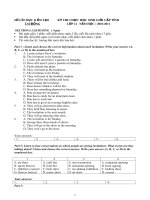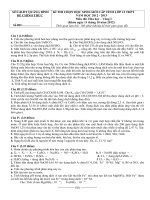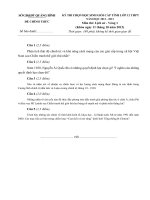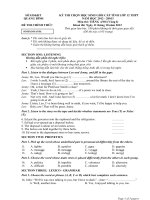Tài liệu SỞ GIÁO DỤC VÀ ĐÀO TẠO PHÚ THỌ ĐỀ THI CHỌN HỌC SINH GIỎI CẤP TỈNH LỚP 9 ppt
Bạn đang xem bản rút gọn của tài liệu. Xem và tải ngay bản đầy đủ của tài liệu tại đây (351.4 KB, 6 trang )
1
SỞ GIÁO DỤC VÀ ĐÀO TẠO PHÚ THỌ
ĐỀ THI CHỌN HỌC SINH GIỎI CẤP TỈNH LỚP 9 THCS
NĂM HỌC 2009 - 2010
Môn: Tiếng Anh
(Đề thi có 05 trang)
I. Choose the word whose underlined part is pronounced differently from the rest by circling the
corresponding letter A, B, C, or D. (20 points)
1.
A. ought B. thought C. brought D. though
2.
A. thick B. think C. thus D. thin
3.
A. foot B. school C. book D. good
4.
A. knew B. grew C. threw D. flew
5.
A. lose B. close C. chose D. rose
6.
A. dosage B. massage C. carriage D. voyage
7.
A. high B. home C. hour D. horn
8. A. passed B. forced C. threatened D. walked
9.
A. break B. steak C. great D. bread
10.
A. confusion B. tension C. seizure D. measure
II. Choose the one word or phrase that best completes the sentence. Identify your answer by
circling the corresponding letter A, B, C, or D. (40 points)
1. What's your birthday, Ann ? - It's .
A. on the thirty-one of July
B. on July the thirty-one
C. on the thirty-first of July
D. in July the thirty-first
2. The sun in the west. Look ! It .
A. set/ is setting B. sets/ is setting C. setting/ set D. set/ set
3. All the boys are good at cooking, but is as good as the girls.
A. either B. neither C. none D. every
4. The weather fine so far this week.
A. is B. was C. has been D. had been
5. I have so many routines that sometimes I feel I am an automatic robot.
A. as if B. even if C. even though D. like
6. The walls of the house are covered a coat of paint.
A. with B. in C. by D. under
7. That was a ceremony.
A. prepared-well B. prepare-well C. well-prepared D. well-prepare
8. That novel was written by a well-known writer. It is worth .
A. to read B. reading C. read D. have read
9. Is this the address to you want the package sent ?
A. where B. which C. that D. whom
10. The father sat by his child’s bedside all night as he was sick.
A. sleep B. asleep C. oversleep D. sleeping
11. He has adopted three orphans his own six children so that, all together, he has nine children to
provide for.
A. except B. beside C. besides D. in place of
12. You should take regular exercise sitting in front of the television all day.
A. in spite of B. instead of C. without D. even
13. I don’t want to go out tonight Anna phones.
A. so that B. even though C. when D. in case
14. I object to like this.
A. be treating B. treating C. being treated D. have been treated
15. Since to a warmer and less humid climate, I’ve had no trouble with my asthma.
A. I move B. I moving C. upon moving D. moving
ĐỀ CHÍNH THỨC
2
16. Shy people often find it difficult to group discussions.
A. take place in B. take part in C. get on with D. get in touch with
17. Our soccer team lost three goals to nil.
A. with B. by C. to D. in
18. Don’t forget to the alarm clock for six o’clock tomorrow morning.
A. set B. put C. ring D. wind
19. Not only did he lose the keys, but he also forgot the tickets.
A. He forgot the pair of tickets to the concert.
B. He didn’t know he had to have tickets.
C. He got the tickets after he found his keys.
D. He lost his keys and forgot the tickets as well.
20. “Do not write on the walls”, said the teacher to the boy.
A. The teacher told the boys do not write on the walls.
B. The teacher told the boys not to write on the walls.
C. The teacher said to the boys not write on the walls.
D. The teacher said to the boys do not write on the walls.
III. There is a mistake in the four underlined parts of each sentence. Identify your answer by
circling the corresponding letter A, B, C, or D. (20 points)
1. Jason’s professor had him to write his thesis many times before allowing him to present it
A B C
to the committee.
D
2. I think Helen is accustomed to work eight hours a day.
A B C D
3. The more frequent you exercise, the greater physical endurance you will have.
A B C D
4. Only when you have had a chance to know various occupations you will decide on your career.
A B C D
5. I tried to do everything to contact John two weeks ago but so far I don’t receive his reply.
A B C D
6. Most students were able of finding good jobs three to six months after graduation.
A B C D
7. The letter was sent by special delivery must be important.
A B C D
8. Because the torrential rains that had devastated the area, the governor sent the National Guard to
A B C
assist in the clean-up operation.
D
9. My brother attends an university in the Midwest which specializes in astrology.
A B C D
10. Although Mark has been cooking for many years, he still doesn’t know to prepare French foods
A B C D
in the traditional manner.
IV. Give the correct form of the words in brackets to complete the sentences. (20 points)
1. Vietnam declared its ________ on September 2
nd
, 1945. (DEPEND)
2. The phone doesn’t work. It’s been _________. (CONNECT)
3. It was a complete _________ due to poor planning. (FAIL)
4. He cycled _________ and had an accident. (CARE)
5. He is thinking of taking early _________ next year. (RETIRE)
6. I am afraid you have _________ me because that is not what I meant. (UNDERSTAND)
7. It is said that the _________ of a Swiss watch is perfect. (PRECISE)
8. Television can make things more ________ because it brings both sounds and pictures. (MEMORY)
9. A famous pianist was _________ for seven years. (PRISON)
3
10. He’s an expert in technology. We call him a _________. (TECHNIQUE)
Your answers :
1.
2.
3.
4.
5.
6.
7.
8.
9.
10.
V. Read this passage carefully and then choose the best answers to the questions below by circling
the corresponding letter A, B, C, or D. (10 points)
A recent investigation by scientists at the US Geological Survey shows that strange animal
behavior might help predict future earthquake.
Investigators found such occurrences in a ten-kilometer radius of the centre of a fairly recent
quake. Some birds screeched and flew about wildly. Dogs yelped and ran uncontrollably.
Scientists believe that animals can perceive these environmental changes as early as several days
before the disaster.
In 1976 after observing animal behavior, the Chinese were able to predict a terrible quake.
Although hundreds of thousands of people were killed, the government was able to evacuate millions of
people and thus keep the death toll at a lower rate.
1. What prediction may be made by observing animal behavior ?
A. the number of people who will die.
B. environmental changes.
C. a coming earthquake.
D. the ten-kilometer radius of an earthquake.
2. Why can animals perceive these changes when humans can not ?
A. Animals are more intelligent than humans.
B. Humans don’t know where to look.
C. By running around, they can feel the vibrations.
D. Animals have certain instincts that humans don’t possess.
3. If scientists can accurately predict earthquakes, there will be
A. a lower death rate.
B. fewer animals going crazy.
C. fewer people evacuated.
D. fewer environmental changes.
4. Which of the following statements is not true ?
A. Some animals may be able to sense an approaching earthquake.
B. All birds and dogs in the ten-kilometer radius of an earthquake center become wild before the
quake.
C. The Chinese have successfully predict an earthquake and saved many lives.
D. By observing animal behavior scientists perhaps can predict earthquake.
5. In the passage, the word “evacuate” most means
A. save B. exile C. destroy D. remove
VI. Read, then choose the best answer by circling the corresponding letter A, B, C, or D. (20 points)
Radar is an electronic device that can “see” great distances (1) fog, rain, snow, cloud, and
darkness. It can find and (2) locate missiles, aircraft, ships, cities, rainstorms, and mountains.
Radar uses radio waves, (3) light waves, which the human eye uses in seeing. This makes it (4)
for radar to locate many kinds of objects at (5) greater distances than the eye can see. Radar
became an important military device during World War II. Today, networks of radar lookout stations
guard the United States and Canada 24 hours a day against (6) missiles and airplanes. Patrol planes
and ships (7) the oceans with radar for hostile ships and aircraft. Airports use radar to (8) .
planes safety to earth in fog or storms. Ships use it to steer clear of other (9) or icebergs. Radar
helps weathermen warn of (10) hurricanes or tornadoes.
1. A. in spite B. despite C. though D. although
2.
A. cure B. exact C. accurately D. accurate
3.
A. instead of B. in addition C. in stead D. in addition to
4.
A. possibility B. possible C. impossible D. can
4
5.
A. near B. farther C. far D. further
6.
A. long range B. near range C. ranged D. length range
7.
A. use B. find C. seek D. search
8.
A. find B. take C. guide D. guidance
9.
A. vessel B. vessels C. sail D. sails
10.
A. to approach B. approaches C. approach D. approaching
VII. Fill in each numbered blank with one suitable word. (20 points)
In Britain there is a holiday now which people call Mother’s Day. In the old days many girls from
working-class (1) in towns and cities and from farmers’ families in the country worked in rich
houses. They had to do all the (2) and their working day was usually very long, they often (3)
on Sundays, too. Once a year, it was usually (4) Sunday in March, they could visit their
mothers. They went home on that day and (5) presents for their mothers and for (6) members
of their families. They could stay at home only one day, and then they went (7) to their work.
People call that day Mothering Day (8) Mothering Sunday.
Later workers at the factories and girls (9) worked in the houses of rich families received
one free day a week, and Mothering Day became Mother’s Day. It is (10) last Sunday in March.
Your answers :
1.
2.
3.
4.
5.
6.
7.
8.
9.
10.
VIII. Finish the second sentence in such a way that it means the same as the sentence printed
before it. (20 points)
1. The furniture was too old for us to keep.
→ It was
2. Nobody has cleaned the streets this week.
→ The streets
3. While mending the road, they accidentally blocked our water pipes.
→ They accidentally cut
4. He brought the umbrella along but it didn’t rain.
→ He needn’t
5. While I strongly disapprove of your behavior, I will help you this time.
→ Despite
6. The underground is quick and cheap.
→ The underground is
7. He was annoyed because his secretary came late to work.
→ He objected to
8. Neil regrets having sold his car.
→ Neil wishes
9. The child ran out because of the strange noise.
→ The strange noise
10. Immediately after his arrival, things went wrong.
→ No sooner
5
IX. Use the word given in brackets and make any necessary additions to write a new sentence in
such a way that it is as similar as possible in meaning to the original sentence. Do not change the
form of the given word. (10 points)
1. “Do you realize what the time is, Steve?” asked Chris. (what)
→
2. I met her while I was staying in Paris last summer. (stay)
→
3. Susan was too excited to sleep. (that)
→
4. Sandra said that she was willing to work late. (mind)
→
5. The coins are believed to be buried for safe-keeping. (It)
→
X. Look at the following sets of words and phrases. Make all the changes and additions necessary
to produce sentences which together make a complete letter of complaint from Jane to Mr. Pike
Smith. (20 points)
Dear Mr. Smith,
1. I write / complain / dirt / smoke / come / your factory / chimneys.
2. Two days ago / I / decide / do / my washing.
3. I wash / sheets / put them out to dry / it / be / nice sunny day/ there / be / breeze.
4. When I take / washing in / I / be / horrified / discover / it / covered / in dirty marks.
5. I / assume / breeze I mention / carry / dirt / your chimneys.
6. Until this accident / I think / your chimneys / be safe and clean.
7. I / suggest / your factory / fit / new filters to its chimneys / as the dirt and smoke / dangerous.
8. I look / receive your reply.
Yours sincerely,
Mrs. Jane Hunter
…………………………………………………………………………………………………
………………………………………………………………………………………………………………
………………………………………………………………………………………………………………
………………………………………………………………………………………………………………
………………………………………………………………………………………………………………
………………………………………………………………………………………………………………
………………………………………………………………………………………………………
6
………………………………………………………………………………………………………………
………………………………………………………………………………………………………………
………………………………………………………………………………………………………………
…………………………………………………………………………… ……
THE END









